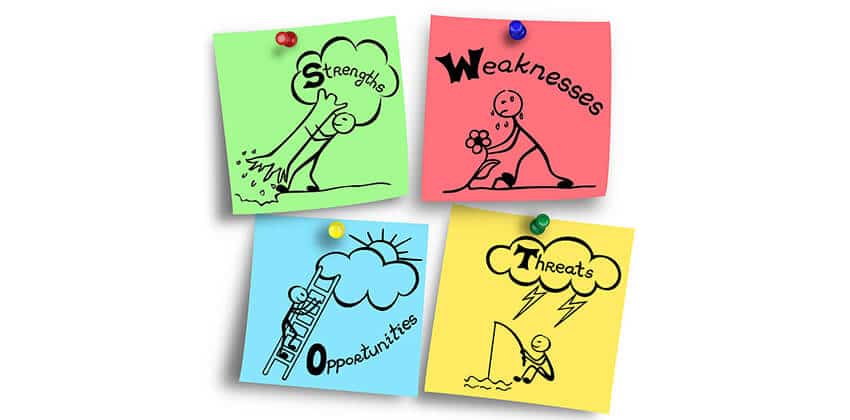
Once a year, smart corporations will go through a strategic planning session to set the direction for the future.
The executives review their mission, vision, and results, and tweak their priorities and execution plans accordingly.
I am a firm believer that you should also perform this analysis on your career at least once a year. And, now, with the coronavirus pandemic forcing many of us to reconsider our work and perhaps re-focus our careers, strategic planning makes sense for us.
A powerful tool used in strategic planning is S-W-O-T analysis: Strengths, Weaknesses, Opportunities, and Threats.
SWOT analysis is usually applied to business opportunities or military situations. Applying SWOT analysis to your current job and your career will provide benefits from the insights you have gathered and, most importantly, enable you to develop an actionable career plan.
Stepping Through the SWOT Process
First, analyze your strengths and weaknesses. Then, analyze your external environment — the opportunities and threats in your world.
You may want to solicit the input of friends and family in this process. Learning what others see and think about us can be very helpful. Create one large list with 4 big blocks or 4 separate lists or a wall section covered with sticky notes divided into 4 groups — whatever works best for you.
STRENGTHS
The first part of the process is to analyze your strengths. This is NOT the time to be modest!
When you create your list of strengths, keep these things in mind:
1. Consider the skills, knowledge, and abilities you have that makes you indispensable to your employer.
Start by making a list of your strengths, particularly the ones you enjoy, and the ones your employer seems to value most highly:
- What do you do well that most other people don’t know how to do or do poorly?
- What do you do that others come to you for help or guidance doing?
- What do you do that gives you the greatest positive visibility within the company? Outside of the company?
- What do you do that has been highlighted as valuable in your job performance reviews?
These are excellent indications of your strengths.
2. Consider the demand for these skills in the marketplace.
Take a look at the economy as a whole. Some parts of the economy are usually growing while others are declining. Do you see anything interesting in the parts of the economy that are growing?
Search Indeed, Google for Jobs, or LinkedIn to see how popular your skills are — how often they are mentioned in job descriptions for jobs open now.
I knew a woman who, for 10 years, had supported her company’s proprietary product-tracking application.
She was great at her job, and her internal customers loved her for her expertise and responsiveness, But, no other company had such a customized application, and moving into a similar role in another firm would be difficult.
So, she had to decide whether she wanted to take the risk of counting strictly on this company for her career, or bolster her marketable skills in others to secure her future.
After some thought and analysis, she took courses in project management, became a Certified Project Management Professional, and moved on very successfully to a career in project management.
3. Consider both your “hard skills” and your “soft skills.”
“Hard skills” are typically those technical skills which you gain through training, like knowing how to program in a computer language. “Soft skills” are those you gain through experience, like leadership.
Think about both your technical as well as your soft skills.
- Do you know web analytics, and how to optimize web sites? Understand Sarbanes-Oxley reporting requirements? Are you a Six Sigma Black Belt?
- Are you great at motivating teams? Are you the one that the executives call upon to use your diplomacy skills to facilitate tricky work sessions and drive consensus among various stakeholders?
These are the strengths that help make up your value proposition.
4. Consider your political strengths.
It is vitally important that you also consider company politics in your assessment, so review the strength of your relationships with people who can influence your career.
- How is your relationship with your boss?
- How is your relationship with the people who influence your boss?
- How is your relationship with your colleagues and/or direct reports?
Draw what I call a “Politics Chart,” which is like an organization chart but details the key influencers that can affect your job. Do the same analysis for your peers and staff.
This is extremely important as we all know competent people who did not succeed because they were not aligned with the right people.
WEAKNESSES
This list is more difficult to do. Being totally honest with yourself is essential for this section, without being too self-critical.
Take a hard look at yourself, and list the areas where you can improve. Consider positions you would like to have, and identify the knowledge, skills, and abilities that you are lacking.
Here again, consider your business relationships, and look for areas where important relationships either don’t exist or need bolstering. Consider:
- Has anything needing improvement been highlighted in a performance review or discussion with your boss, co-workers, or customers/clients?
- Is anything happening in your environment (your employer, your industry, or your work/profession) that makes you feel vulnerable or unprepared?
- Do you feel that you are being out-performed in some way by a co-worker?
- Do you feel you are less effective in doing some things than you would like to be?
- Do you avoid any part of your work because you feel you don’t have the appropriate skill level or you just don’t like to do that work?
- Are you lacking any skills that are required for a job you would like?
Often input from your family and friends can provide a valuable outsider’s perspective both of you and your skills and weaknesses and also your environment.
Add these to your list.
OPPORTUNITIES
Now to the fun part, which can also be rather eye-opening. Consider the possibilities that surround you.
Like the people, mostly women, who were excellent typists in the 1990s saw the need for typing skills disappear as computers and word processing software became much more common and reliable, look at where the demand for your strengths may be increasing.
Let your mind wander:
- What elements of your work do (or did) you enjoy doing the most?
- Is anything new happening in your work world that looks fun or interesting to you?
- Are new projects or initiatives being considered?
- Do you see any areas where new projects or initiatives should be considered, but aren’t (yet)?
- Any classes you would like to take? Certifications that look interesting or appealing?
- Is your boss or another manager nearing retirement or getting ready to move on?
Focus on areas of the business where you can contribute and gain a better position, perhaps in a different department or location. Or, possibly in a different company or profession?
Have you acquired skills or knowledge that are scarce and in high demand?
Look both within, and outside, your company. Many people discover real opportunities that are available which they had never considered before.
Add these to your list.
THREATS
Now think about all the things that can go wrong. This is where you can let your internal Gremlin (the little voice in your head that tells you the sky is falling) run wild, and list everything that comes to mind.
Consider negative aspects of your current work or job, such as:
- Elements of your work that are the least pleasing to you or the most difficult to accomplish.
- Limited opportunities for growth, training, or advancement in your current job.
- Your industry or field is “in decline” and perhaps disappearing.
- A shift in management has happened or is pending.
- Your manager does not seem to value your work or is difficult to work with.
- A brilliant competitor who takes over the market.
- Someone else getting promoted to a position you wanted.
- Your job may become permanently “remote” and you don’t like to work that way (or vice versa).
- Budget cuts.
- Downsizing.
- Outsourcing.
- Mergers.
- Acquisitions.
- Your health.
- Anything else that worries you.
Since we are experiencing the COVID-19 pandemic, we have new insight into potential threats.
Add these to your list.
Make Your Plan for Your Job or Career
Now that you have your lists, make a plan.
- I like to start with the opportunities because many times people have uncovered positions that they would really like and had not considered before.
- Identify where you would like to be, then review the strengths and relationships you can leverage to get there, and the weaknesses you have to consider – or overcome – that could hold you back.
- Prioritize your biggest threats, and make a plan to neutralize them.
- Then, go for it!
If you have never done this, try it! It is a proven method to build actionable plans that will lead you to success.
The Bottom Line on a SWOT Analysis for Job Seekers & Career Planning
Analyzing your options with a focus on your opportunities as well as the threats you face will help you make a rational decision on what career is the best fit for you in the future, or at least for the next step in your career. Take the time to do the SWOT analysis, and you will head in a direction that will help you find the best opportunity for your next job.
Making a Successful Career Change:
- Busted: Job Search Myths Hurting Your Career Change
- Launch Your Career Change to Manager with the Right Resume
- How to Make a Massive Career Change with No Relevant Experience
- 7 Signs It Is Time for a Career Change
- LinkedIn for Career Changers
 About the author…
About the author…
Don Goodman is a triple-certified nationally recognized career professional (Expert Resume Writer, Certified Career Coach, and Job Search Strategist) with over 20 years of experience helping thousands of people quickly land their next job. Don graduated from the Wharton School of Business and Stanford University’s Executive Program.
More about this author…
Don't forget to share this article with friends!




